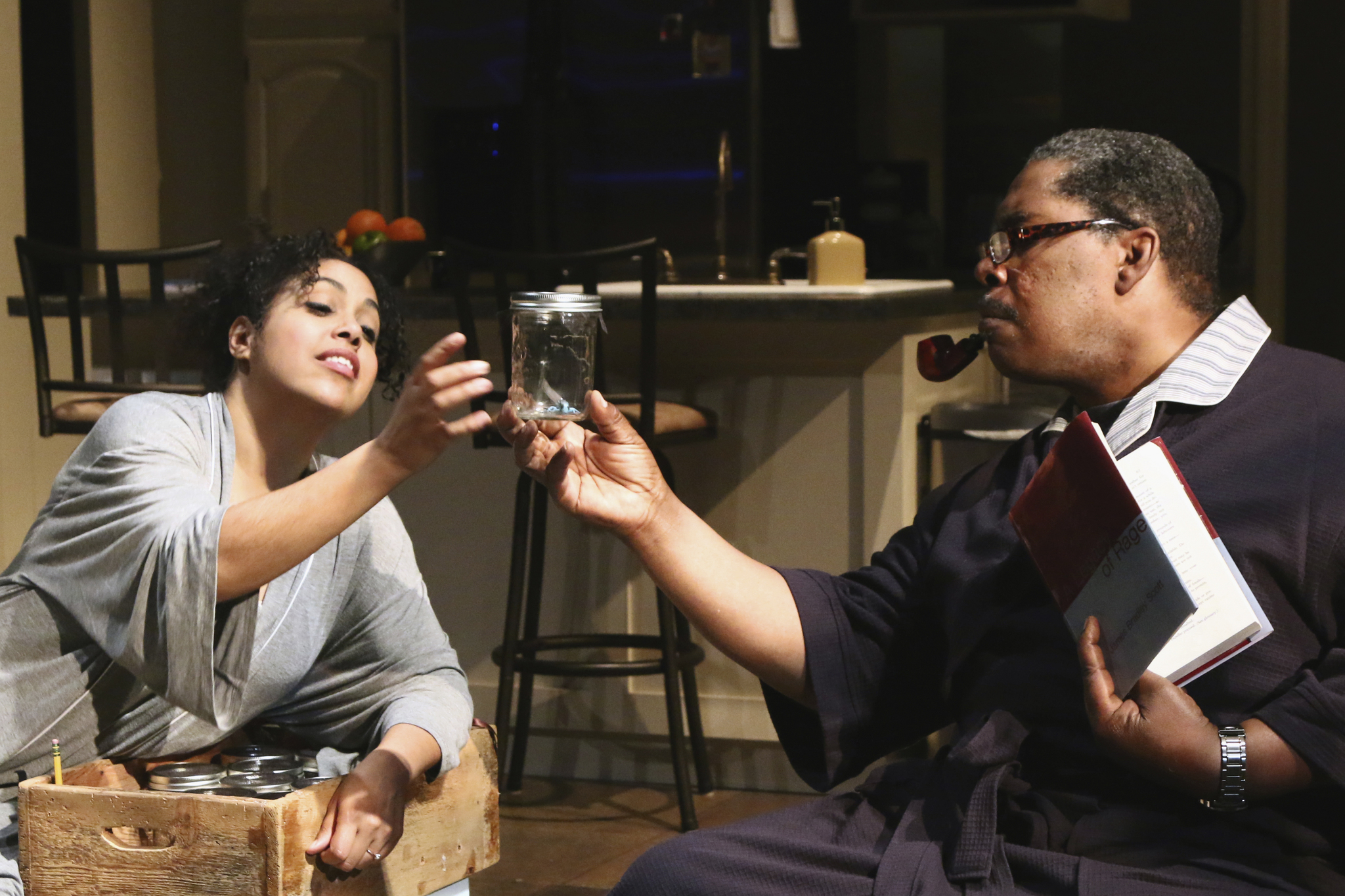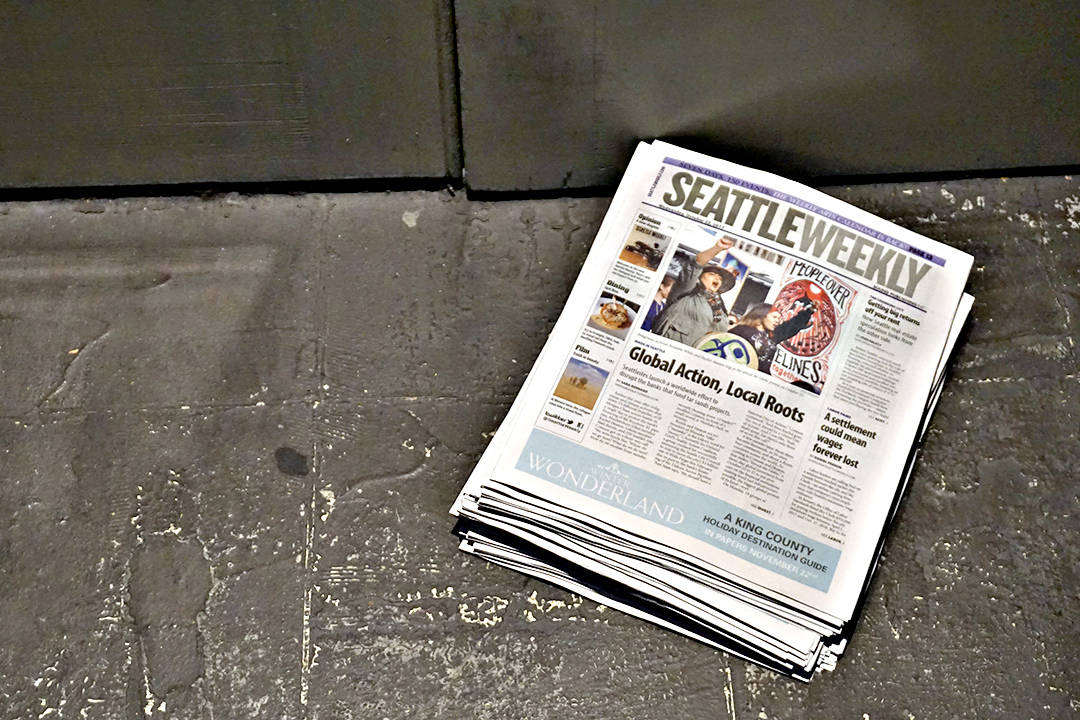Even before the action starts on Intiman Theatre’s production of Stick Fly, the writing is on the wall. Projected onto the interior of the Langston Hughes Performing Arts Institute, alongside the sturdy and well-appointed interior of a Martha’s Vineyard home where the story takes place, are quotes from Black American and African thinkers and writers. Words from Audre Lord, Malidoma Some, and Howard Thurman about family and suffering fade in and out. Each frames this production of Lydia R. Diamond’s play nicely, but the Alice Walker quote, in particular, lingers as the story of a family coming together and tearing itself apart unfolds. “Healing begins where the wound was made.”
Wounds abound in Diamond’s complex, effervescent, and ultimately devastating story of the LeVay family, directed here by Justin Emeka with both nuance and verve. It is not a spoiler to say that the inflicting force is racism, yet this play is not a blunt polemic. Rather, it is an intimate look at the pressures that wide-spread racism can exact on the Black American family, the fissures that form under those pressures and the destructive selfishness and self-doubt that can fill in the cracks.
The cracks aren’t apparent at the outset of this play, which is, it should be noted, a comedy. Inside the family’s Martha’s Vineyard vacation home, the trappings of affluence abound. In the living room, original artworks by Romare Bearden hang on the walls, while books and pinned butterflies fill the shelves; in the kitchen, a maid dances to Rihanna while preparing for the family’s arrival. And one by one they do, each bringing with him a secret that has the potential to forever change the family. First is youngest son Kent with his fiancee, then older brother Flip, followed soon after by his new girlfriend, a white woman, and finally the father. Conspicuously absent is the mother, who is generally the first to arrive on these weekends. She isn’t the only no-show; the young maid, we learn, is working because her mother, the family’s long-time maid, is too ill to do the job.
The missing matriarchs are the subject of passing concern, but it is fathers who shape this story. The LeVay father, a doctor played with an infuriating but appropriate obstinance by G. Valmont Thomas, lords over the household, applying varying degrees of force in an attempt to shape his sons’ lives. Flip, a plastic surgeon played with a cool intensity by Reginald Andre Jackson, is his pride; Kent, an aspiring author played admirably like a folding chair by Tyler Trerise, his shame. There is the sense that the father is looking out for his sons—that he understands the ugly reality that they must do better to survive in a racist culture—but there is also a mean-spirited edge to his admonishments that you can see warping his sons. It’s little wonder that the novel Kent has just sold to a small publishing house is a fictionalized account of his troubles with his dad.
Kent isn’t the only author in this story. As Mr. LaVay is eager to note, Kent’s fiance Taylor is the daughter of a famed Black American academic. Yet, Taylor is reluctant to talk about her father, only later revealing that she and her mother were abandoned by him early on, left to fend for themselves, relegated to a lower-middle class existence. Taylor has done well for herself and works as an entomologist, a job that gives her some connection to Kent’s missing mother and provides the play’s titular metaphor.
But the class distinction is a thing for Taylor, a fact that is made evident during small comedic moments that she shares with maid Cheryl, played with startling power by newcomer Amara Granderson. The seriousness of Taylor’s distress, though, is only truly revealed in the play’s late-night scenes, after Mr. LeVay goes to bed and the children are left to their own devices. It is here that Taylor takes center stage, Chantal DeGroat playing her with tremendous generosity as she pushes at the edges of her identity, proving her smarts during board games, play-acting a role as a member of the moneyed elite, and sparring with the other characters about power and privilege. In the latter, her foil is Flip’s girlfriend Kimber, a pleasantly pretentious Bhama Roget, who leans on her experience working with “inner-city youth” to challenge Taylor’s assertions. Despite the heaviness of the topic, the momentum of these scenes push the plot forward, inebriants helping to punch up the humor as the dialogue moves swiftly, never dwelling for too long in a single place, the questions of the group’s racial dynamics never quite settled, and personal drama always, eventually, intervening.
It is in these exchanges that Diamond’s script feel so fresh and raw, despite the fact that it was written ten years ago, prior to the most recent transformation of mainstream America’s racial politics. In this, it is an excellent opening to this year’s Intiman Festival, which is dedicated to plays by Black American women. The goal is to expose Seattle audiences to different perspectives, to broaden the conversation. One hopes for greater clarity from such a broadening of perspective and there is some on offer here. But there are no prescription for how to heal those wounds that Alice Walker speaks of. Diamond can only reveal where they come from and how deep they truly are. Langston Hughes Performing Arts Institute, 104 17th Ave. S, 315-5838. $20-40. 7:30 p.m., Wed.-Sat.; 2 p.m., Sun. Through Jun 19.








